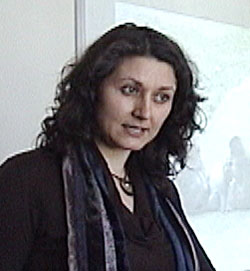Show and tell

Kate Bligh helps “direct” professors who are uncertain in front of a class.
courtesy Kate Bligh
Director Kate Bligh brings acting techniques to the classroom to help teachers communicate with their students. In a recent workshop called Enhancing Your Presentation Skills, the enthusiasm of the participants was palpable.
Bligh told them how tenseness restricts the voice, and advised them to warm up their vocal chords before an early-morning class with some informal chat at a coffee shop. She got a professor to read a simple poem until he could deliver it in a natural, flowing manner, and he was delighted with his performance.
She demonstrated how to stand, with both feet firmly planted below the hips. An erect, well-balanced stance sends the message that you know your subject.
“You cannot be too big in your gesticulations,” she told them. Waving your arms at the right moment can dramatize your message. It can be playful, and that’s a legitimate part of learning.
Bligh, who teaches in both the English and Theatre Departments, knows all about nervousness. She tells teachers “stage fright can be useful if you choose to use it properly and not allow yourself to become overwhelmed by it.”
Smile, but only in moderation. Bligh says a smile is a gesture of submission. As a rule, male teachers don’t smile enough, and women smile too much.
“Appreciate your students’ questions,” she told the professors. “Use phrases like, ‘That’s a good question,’ ‘I’m glad you asked that.’ If you have to, write those phrases down and use them as a prompt.”
The most common faults she sees are “lack of eye contact, and body language that sends negative signals such as 'I don't really want to be here' or 'You are unimportant to me.' Also, horrendous use of visual aids, especially where PowerPoint is concerned.”
Teachers are usually surprised when their bad habits are pointed out to them, Bligh acknowledged. “It can make people very self-conscious at first. These are the habits of a lifetime, so I usually suggest that each person focus on correcting only one or two things in the workshop.”
Olivia Rovinescu, the director of Concordia’s Centre for Teaching and Learning Services (CTLS), sets up Bligh’s workshop sessions, which 33 faculty members have taken so far. Some are new to university teaching, but others have been teaching for many years.
“People see remarkable improvements,” Rovinescu said. “We've had seven of these workshops over the past two years. They get an extremely positive response, so we give them each semester.”
Presentation Skills I is billed as “a constructive, practical and liberating approach to enhancing classroom performance.” Now there’s Presentation Skills II, which Bligh has just done with two alumnae of last year's courses.
“I have to say I was amazed at the transformation in these two,” she said. “They seemed to have fixed far more than I would have expected, and at the same time, each had kept one or two core bad habits that we worked on again this time.
“The difference in terms of their teaching enjoyment and confidence was really startling — you know, the kind of 'before' and 'after' that you see on cheesy infomercials and never believe. Only in this case, I believed it because the proof was right there before my eyes. It was very rewarding.”
You can sign up for these workshops on the CTLS website. The next one is scheduled for the third week of August. If the workshops fill up, more can be scheduled.
Bligh also offers a classroom observation service. She sits quietly through someone's class and then meets with the teacher so they can create a strategic plan together. “We've turned several people's student evaluations around in this way,” she said. This service is also available on request from the CTLS, at ext. 2495.
“Many people come to the workshop quite nervous and wary, and end up having a really enjoyable day. People leave wondering why they didn't do this years ago, and many comment that it should be mandatory for all new faculty.”